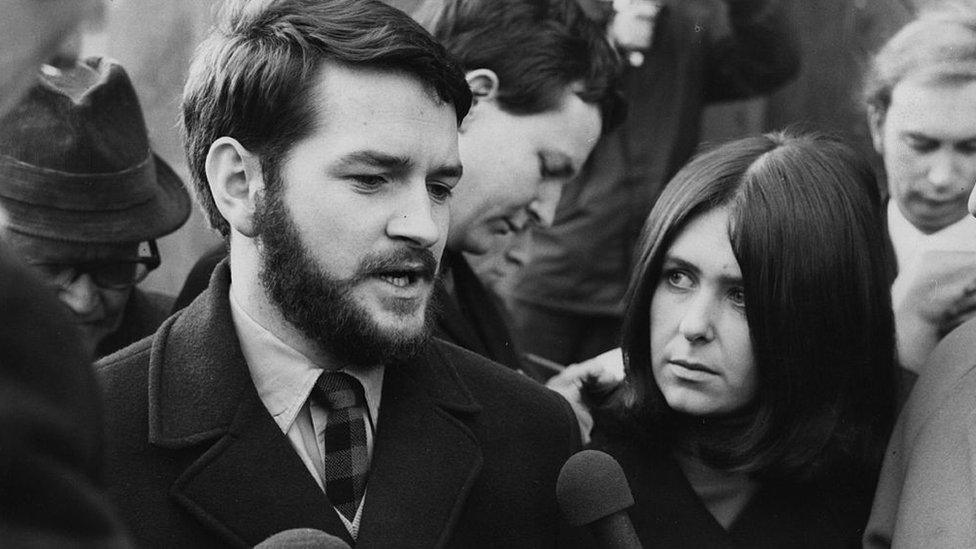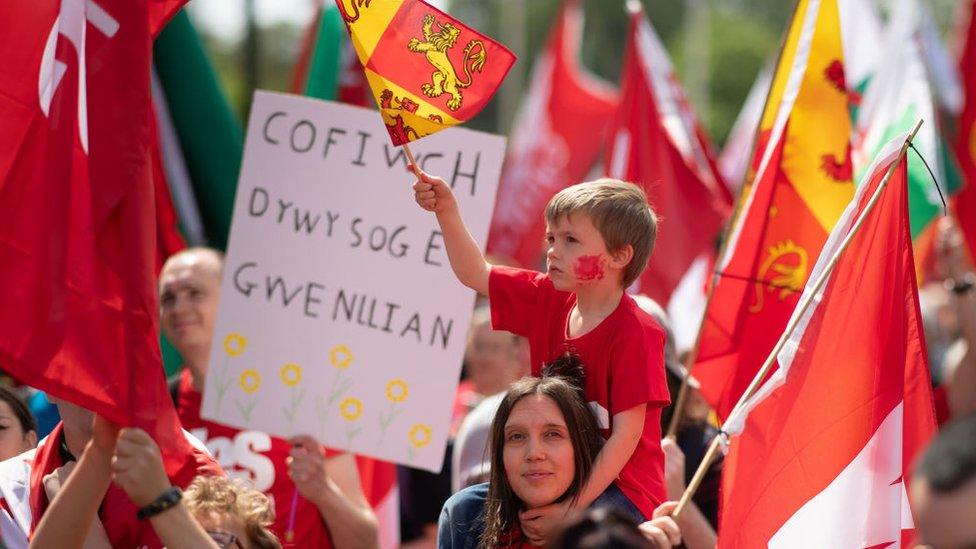World Cup 2022: Wales' qualification revives Yma O Hyd success
- Published

Dafydd Iwan's Yma O Hyd was written in response to Thatcherism and the unsuccessful Welsh devolution referendum of 1979
A folk song that brought the house down after Wales qualified for the World Cup on Sunday has enjoyed a revival with a flurry of streams 40 years after it was written.
As the rain lashed down, a visibly emotional Dafydd Iwan joined the players on the pitch to perform an epic rendition of his Welsh-language song Yma O Hyd, which means "still here".
The song has cemented its place in the nation's heart, with fans seeking out Yma O Hyd tattoos and art prints bearing the song's title selling fast.
For Iwan, 78, who has spent a lifetime campaigning and has even been imprisoned for his defence of the Welsh language, external, it was a very special moment.
'Tremendous feeling'
"Singing is an emotional experience anyway, but singing along with 30,000 or whatever it was - it just adds to the emotion and knowing that so many followers of football who don't speak Welsh are so engrossed in this song... it's a tremendous feeling," he said.
"It's as if I've been practising for 39 years to arrive at this point and it was a tremendously fulfilling moment for me."
Earlier this week it reached number one in the iTunes chart, knocking off Kate Bush's Running Up That Hill.
Allow YouTube content?
This article contains content provided by Google YouTube. We ask for your permission before anything is loaded, as they may be using cookies and other technologies. You may want to read Google’s cookie policy, external and privacy policy, external before accepting. To view this content choose ‘accept and continue’.

Yma O Hyd was originally recorded in 1981 and released in 1983.
It tells the story of how Welsh language and culture has survived more than 2,000 years against all the odds.
The chorus goes: "Er gwaetha pawb a phopeth, Ry'n ni yma o hyd", which translates as "Despite everyone and everything, We're still here".
"It's a song of survival really and that resonates with people in various ways," said Iwan.
"We've gone through a dark period, we're coming out the other end and we're going to survive."

Dafydd Iwan said he was delighted to see the Wales team singing his Welsh lyrics
It is the second time the song has found itself at the top of the charts in recent years. In January 2020, the song also reached number one in the iTunes UK song chart, partly due to a campaign by independence movement YesCymru.
Spotify said streams of the track increased 200% between Saturday and Sunday.
'Tears streaming down my face'
But what is it about the song that has such an impact on people?

Rhys Thompson (second left in the front) sang along to Dafydd Iwan's anthem at the game on Sunday
Rhys Thompson, 22, from Pencoed in Bridgend county, was at the game on Sunday.
Despite not being a Welsh speaker, he knows every word to Yma O Hyd and said he got caught up in the "massive feeling" of the crowd.
"It's just a massive feeling and a pride to be Welsh, we're still here... we're always going to be there, no matter what," the Newcastle University student said.
He said the song was played at his grandfather's funeral in March, so he found the rendition on Sunday particularly emotional.
"Tears were streaming down my face... [the song] means even more to me now."

Rhys Thompson (right) with a friend at the game
'Goose bumps'
Dafydd Iwan, who is from Brynamman, Carmarthenshire, has heard this sort of thing many times before: "People talk about goose bumps and hairs standing up on the back of their necks," he said.
"Others have said, 'I've never heard a song like this'."
He said the Welsh comedian Mike Bubbins told him he had first heard the song when lifting weights at the gym and it had made him feel like he could lift 100 tonnes.
"What gives a song that power is beyond me but I'm glad, it is something I will always be thankful for," he said.
"I don't think I will ever write a song with more power and which gets more of a reaction than this one."

Art prints of Cardiff City Stadium emblazoned with the song's title have been selling quickly since Sunday's game
A small industry has begun developing alongside the song's popularity.
Katdemon Ink Tattoo Studio, in Cardiff, said it had people who wanted to get a Yma O Hyd tattoo on its waiting list.
Designer Matthew Wood, in Sheffield, has sold more than 50 prints of Cardiff City Stadium emblazoned with the song's title since Sunday's game.
He said he already knew the song through BBC Radio 5 Live presenter and Wales fan Elis James.
"Hearing it live in the stadium was just very powerful, and the message behind it - still here - just really speaks to me," he said.
"I think I should have patented the phrase a long time ago, missed a trick there," joked Iwan.
"It will be here a long time after I've gone."

Dafydd Iwan was released from Cardiff prison on 6 February 1970 after being imprisoned for daubing English road signs with slogans
In recent years the folk song has been adopted by several sports teams, including rugby clubs and Wrexham AFC, but its origins are more political than sporting.
"I wrote it during a time which was not very good to me personally and also quite a disastrous period in the history of Wales," said Iwan, who went on to be Plaid Cymru's president.
"[It was] during Thatcherism, the closing of the mines and the steel mills, and the farmers were under pressure - there was a general air of discontent, we'd just failed miserably in the devolution referendum of '79, so by the early '80s we felt that we needed something to raise our hopes and boost our self-confidence so Yma O Hyd was written with that purpose in mind."
Now he hopes the song will play a part in teaching the world about Wales and its language during the World Cup.
Allow X content?
This article contains content provided by X. We ask for your permission before anything is loaded, as they may be using cookies and other technologies. You may want to read X’s cookie policy, external and privacy policy, external before accepting. To view this content choose ‘accept and continue’.

"The World Cup will be a tremendous platform for us to show what we can do and to teach people about Wales," he said.
"We've had enough of going to other countries and having to explain what Wales is and that we're not in England.
"We've got a different way of doing things, different culture, we have a different language."
But Wales fans hoping for a repeat of Sunday's performance from the man himself when it kicks off in Qatar in November are going to be disappointed: "I don't go to away games really and nothing much draws me to Qatar, but I'll be wearing all the paraphernalia in front of the TV."
He is hoping the song will travel with the fans: "It's driven by the supporters and that's what I like about it.
"It's not something which has been foisted on them or suggested by a PR guru, it's something which has grown from the roots."

THE HIDDEN WORLD OF FOOTBALL: The collapse of a football team run by a wannabe pop star
FEAST OF FOOTBALL: Chew over the week's football with Elis James

- Attribution
- Published5 June 2022

- Published7 June 2022

- Published27 March 2022

- Published17 December 2020
